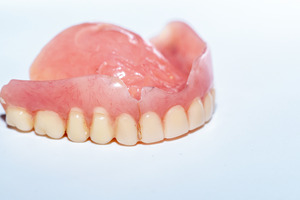
Dentures are a valuable solution for replacing missing teeth, offering both functional and aesthetic benefits. However, maintaining them requires diligent care and attention. To ensure your dentures last as long as possible and remain comfortable, it’s important to avoid certain harmful habits. Here’s a look at three key habits to steer clear of when wearing dentures.
Skipping Proper Cleaning
One of the most damaging habits for denture wearers is neglecting proper cleaning routines. Dentures are prone to accumulating bacteria, plaque, and food particles, which can lead to infections and bad breath if not cleaned regularly. Unlike natural teeth, dentures need special care. Failing to clean them daily can also cause staining and deterioration of the materials. It’s essential to use a denture-specific cleaner rather than regular toothpaste, as the latter can be too abrasive. Additionally, soaking your dentures overnight in a recommended solution helps keep them free from bacteria and prevents them from drying out, which can cause warping.
Using Teeth as Tools
Using your teeth to open packages, crack nuts, or even hold onto objects is a bad idea with natural teeth, but it’s even worse with dentures. Dentures are designed to handle the normal pressures of chewing food, but they are not meant to withstand the stress of non-food items. Engaging in these habits can lead to cracks, chips, or even breaks in the denture material. Once damaged, dentures can become uncomfortable and ineffective, requiring costly repairs or replacements. It’s important to treat your dentures with care, only using them for their intended purpose—eating and speaking.
Ignoring Discomfort or Poor Fit
Another harmful habit is ignoring discomfort or a poor fit in your dentures. Dentures that don’t fit well can cause sore spots, blisters, and even infections in your gums. Over time, the shape of your gums and jawbone can change, making it necessary to have your dentures adjusted or relined. If you experience persistent discomfort or notice that your dentures are slipping or clicking when you talk or eat, it’s important to see your dentist. Ignoring these issues can lead to more serious problems, such as gum recession or bone loss, which can complicate future denture use.
About the Author
Dr. Rob McVety’s favorite thing about his work is the smile on their faces once his work is done and they get a look at their new teeth. That motivates him to always work his hardest, both in creating new smiles for his patients and helping them preserve the ones they have. Dr. McVety received his dental degree from the University of Connecticut School of Dental Medicine. He has also studied extensively with the Nash Institute and the Spear Faculty Club.
If you have any questions about dentures, we can be reached at our website or by phone at (207) 517-7008.
